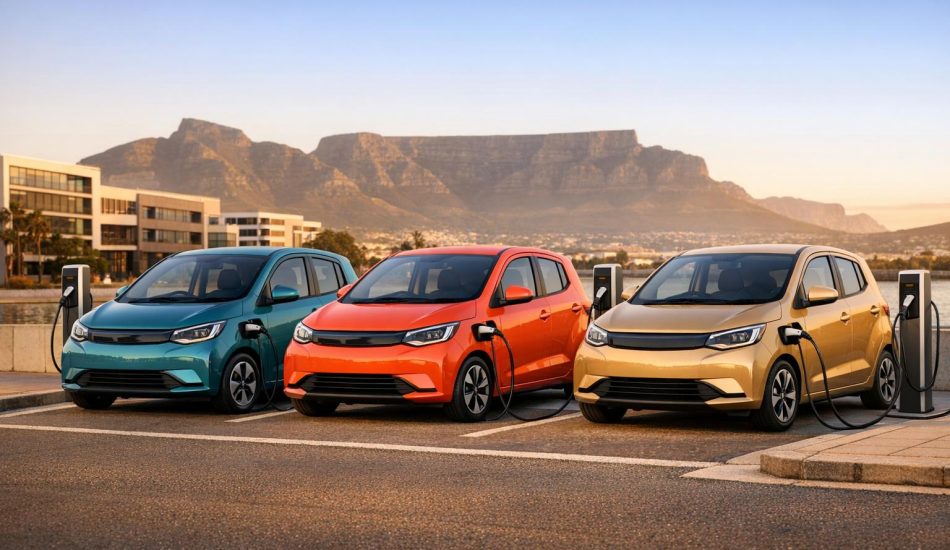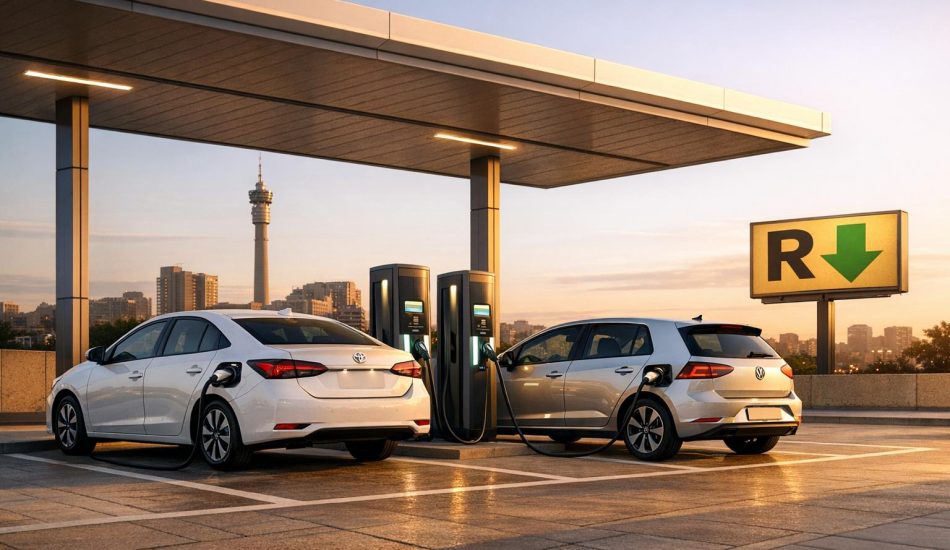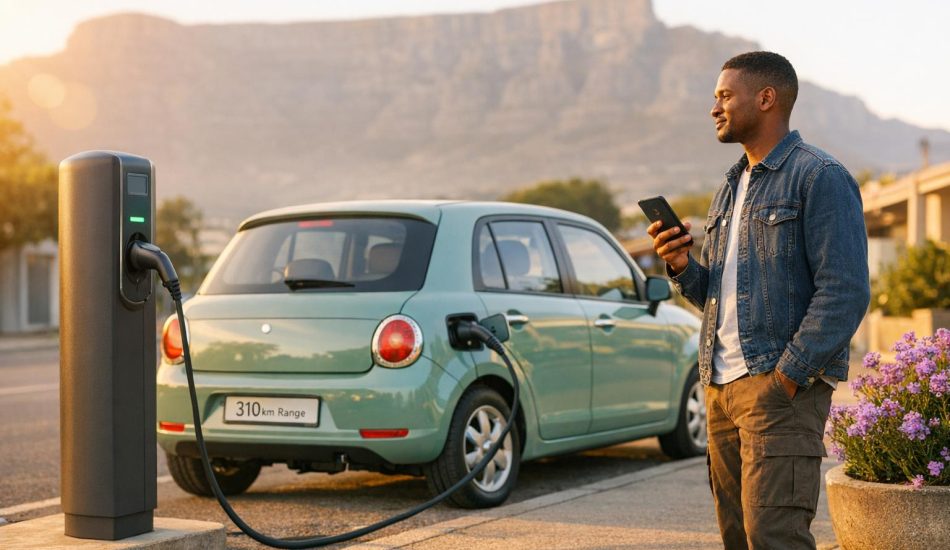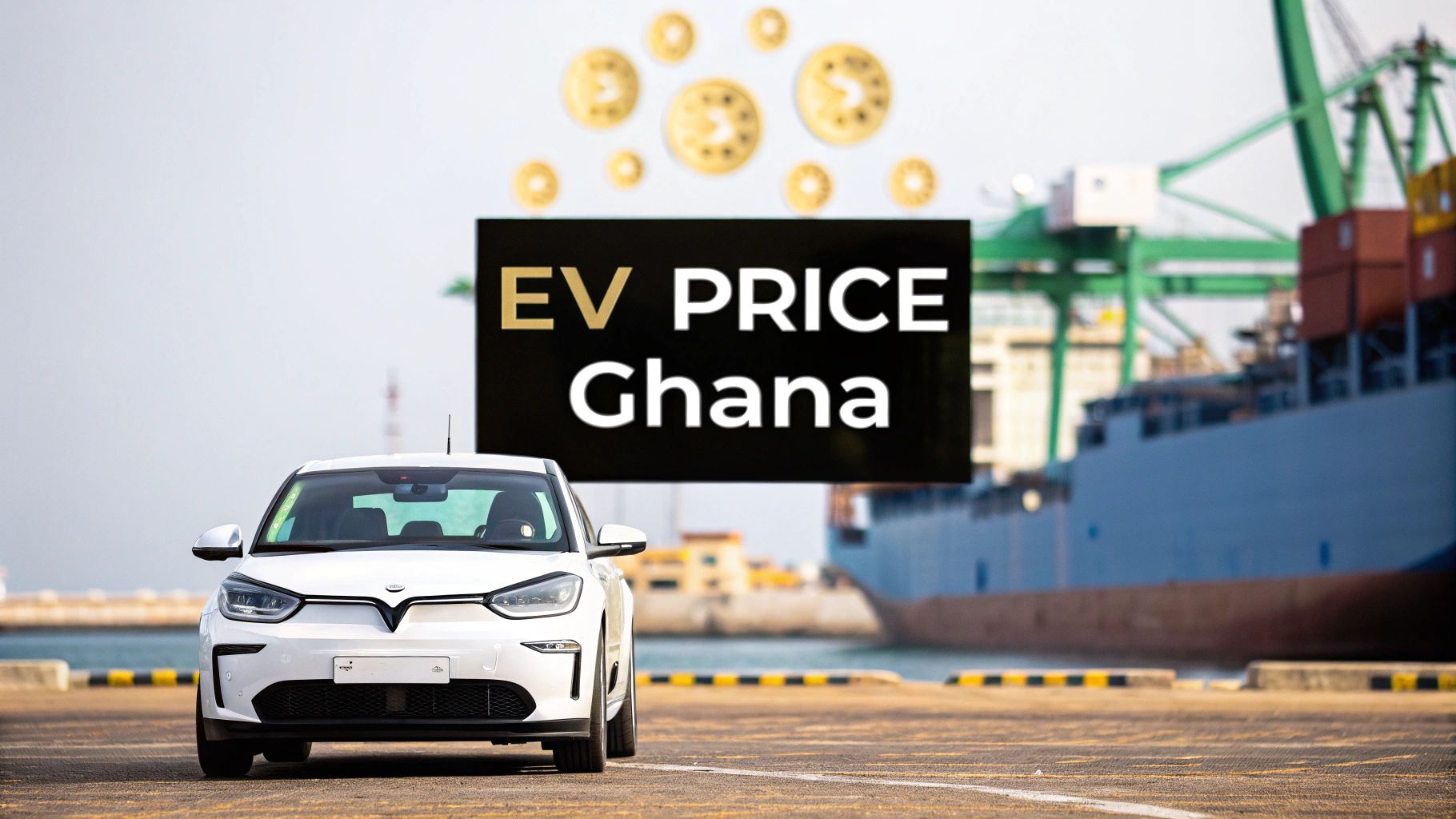
Figuring out the price of an electric car in Ghana can feel a bit like putting together a puzzle. At a glance, you'll see prices ranging from around $21,000 for more accessible models all the way up to $66,000 and beyond for premium brands. But that initial sticker price is really just the starting point of the conversation.
Breaking Down the True Cost of an EV in Ghana
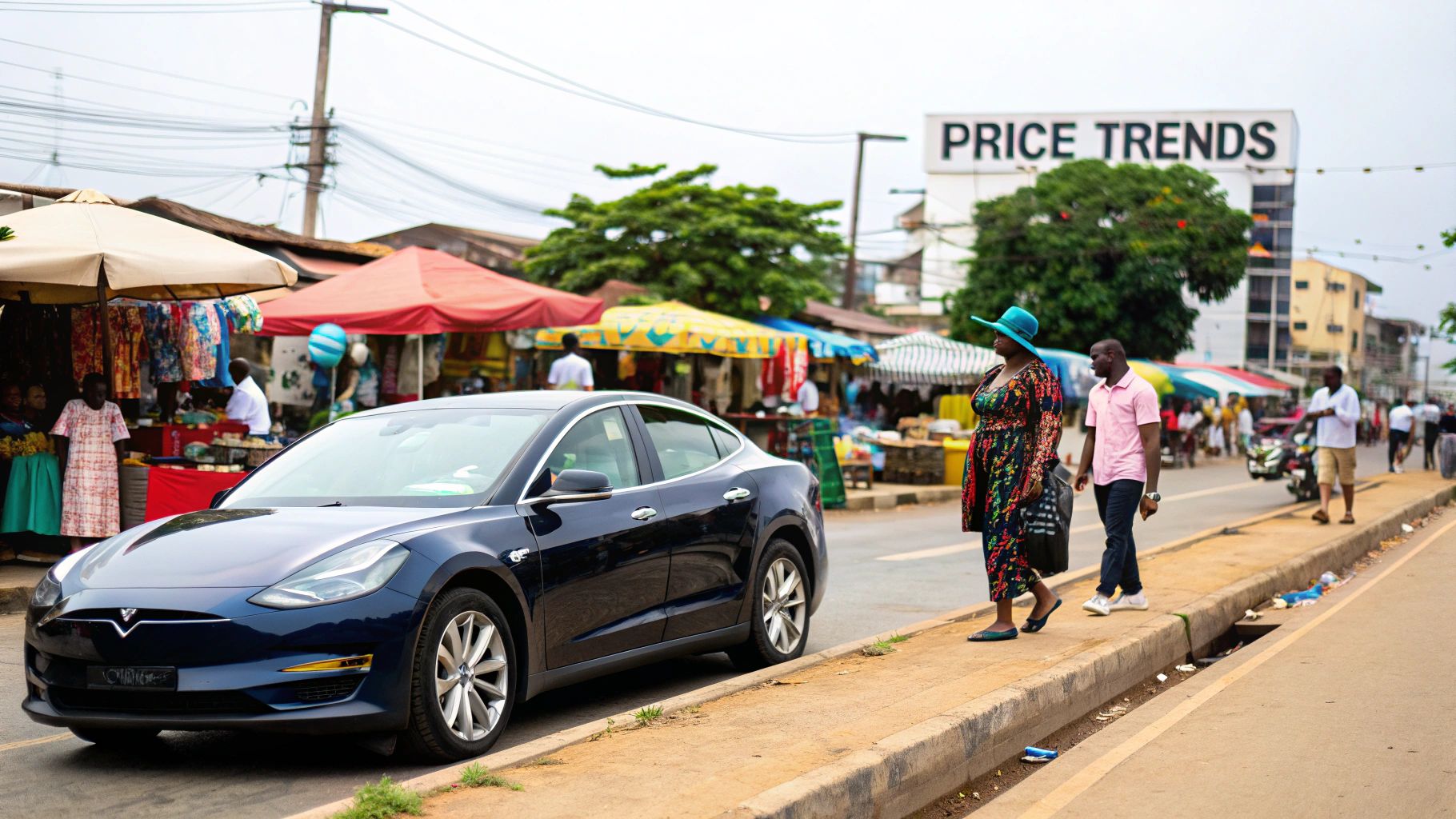
To get a real sense of what you'll actually pay to have an electric car on the road in Ghana, you need to look past the manufacturer's price tag. Think of it like this: the price you see online is just the cost of the car itself. Getting it from the factory to your driveway involves a few more crucial financial steps.
To budget properly and avoid any nasty surprises, you have to account for the vehicle’s entire journey. It’s a multi-stage process, and each stage adds to the final cost.
Key Financial Components
The total investment really boils down to four main cost centres. We'll dive into each of these in more detail, but here’s a quick overview to get you started:
- Base Vehicle Cost: This is the sticker price. It's dictated by the brand, model, battery size, and all the features you choose.
- Shipping and Freight: Unless the car is assembled right here in Ghana, it has to be shipped, and that comes with significant costs.
- Import Duties and Taxes: This is a big one. Government tariffs and local taxes add a substantial amount to the final price.
- Registration and Clearance: These are the final administrative hurdles and fees needed to get your EV legally on the road.
As we look at the market in 2025, the electric car price in Ghana shows a wide spectrum. Entry-level EVs are making ownership more attainable, with cars like the Leapmotor C01 and ROX R7 starting at roughly $21,000. If you're looking for a solid middle ground, mid-range options like the popular BYD Atto 3 or Hyundai Kona Electric typically fall between $30,000 and $40,000.
For those wanting the best in performance and luxury, premium models such as the Tesla Model 3 and Hyundai Ioniq 5 can push the price up to $66,900 or more. For a deeper dive into the latest 2025 pricing and to compare different models, a great resource is EV24.africa.
To give you a clearer picture, here’s a simple breakdown of what to expect across different market segments.
Estimated Price Ranges for Electric Cars in Ghana
| Vehicle Category | Example Models | Estimated Price Range (USD) |
|---|---|---|
| Entry-Level | Leapmotor C01, ROX R7 | $21,000 – $30,000 |
| Mid-Range | BYD Atto 3, Hyundai Kona Electric | $30,000 – $45,000 |
| Premium | Tesla Model 3, Hyundai Ioniq 5 | $45,000 – $67,000+ |
As you can see, there's an EV for almost every budget. The key is knowing which category fits your needs and understanding the full cost associated with it.
By getting to grips with each cost component, you shift from being just a buyer to becoming a smart, informed investor. This knowledge gives you the power to plan your budget, sidestep hidden costs, and navigate the buying process with total confidence.
Decoding the Full Cost of Importing an EV
The sticker price you see online for an electric car? That’s just the starting line. To get a real grip on the electric car price in Ghana, you have to look past that initial number and trace the entire journey your car takes from the showroom to your driveway.
Think of it like building a house – the plot of land is just one part of the total cost. You've got to factor in materials, labour, and permits. It's the same with importing an EV; there are several distinct costs that pile up long before the car even lands in Ghana. Getting these numbers straight from the beginning is the key to setting a realistic budget and avoiding nasty surprises later on.
From Factory to Port: The Shipping Equation
Once you've bought the car, the next big hurdle is getting it here. International shipping isn't a footnote; it's a significant expense that can easily add thousands of dollars to your final bill. Your main choices are either Roll-on/Roll-off (RoRo), where the car is driven onto the ship, or container shipping.
For instance, shipping a typical saloon EV from a port on the US East Coast, say New York, inside a shared container will probably set you back around $1,600. RoRo might be a little less expensive, but putting your car in a container gives you far better protection against weather, dings, and scratches.
But the main freight charge is only part of the story. You also need to budget for:
- Transit Insurance: An absolute must-have. This covers you if your car gets damaged or, in a worst-case scenario, lost at sea.
- Port Handling Fees: Both the port of origin and Tema Port will have charges for loading, unloading, and managing your vehicle.
- Inland Transportation: If the car isn't already at the departure port, you'll need to pay to get it there first.
This visual breaks down the simple steps to claim government incentives, which can help take the sting out of some of these import costs.
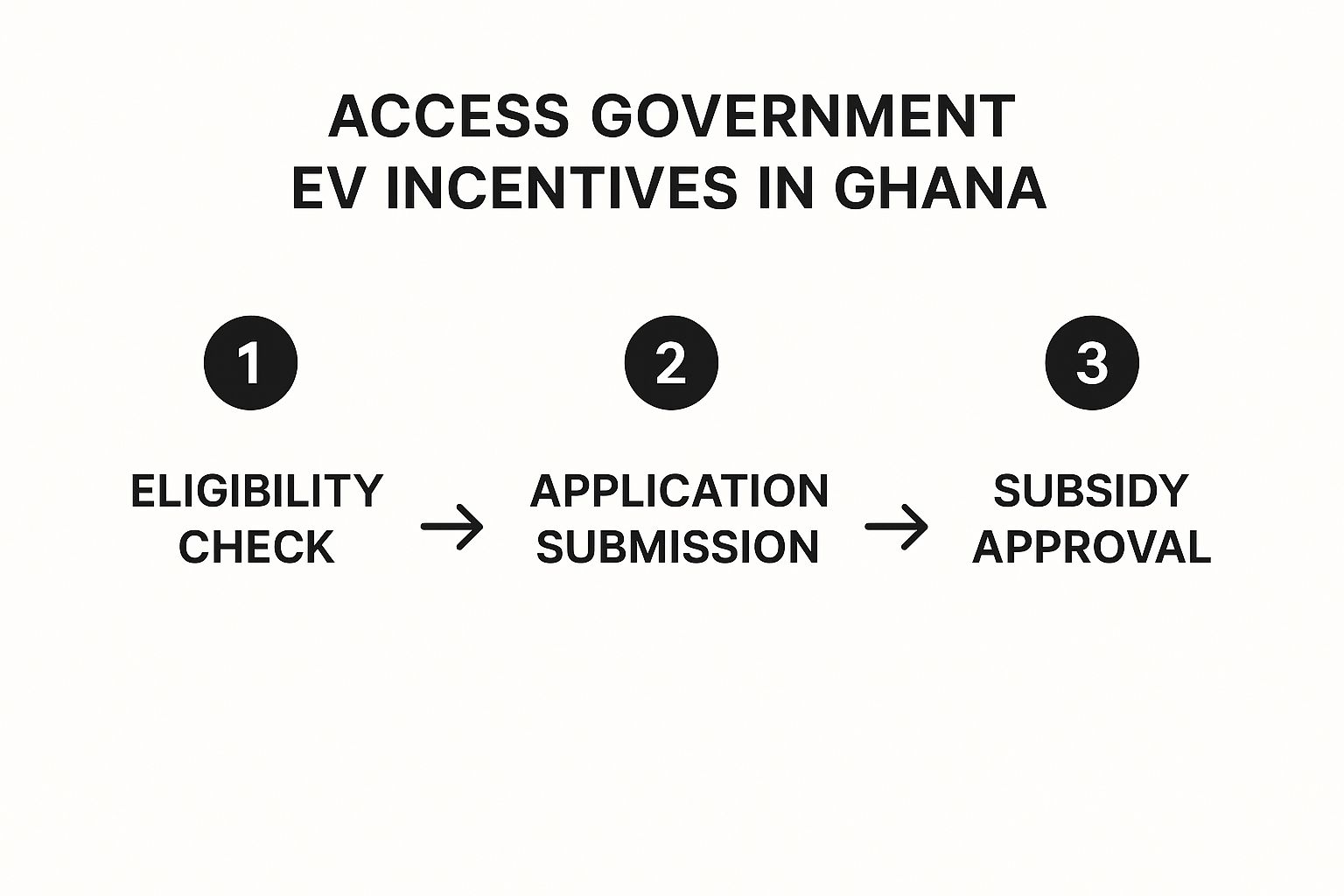
As the infographic shows, there’s a clear process in place, starting with an eligibility check, designed to help you lower your final expenses through official government channels.
Calculating Your Landed Cost
Let's put this into perspective. Say you find a great deal on a mid-range EV for $35,000. By the time you add up all the shipping and associated fees, that number will climb higher. This is why a detailed breakdown is so critical.
Key Takeaway: The "landed cost" is the true price tag of your EV right as it arrives. It's the vehicle's purchase price plus all the shipping, insurance, and handling fees needed to get it to Tema Port.
This landed cost is a crucial figure because it's what customs officials use as the starting point to calculate import duties and taxes. We'll get into those next. For a complete, step-by-step breakdown of these specific charges, our Ghana EV import guide for 2025 covers everything you need to know about tariffs, registration, and clearing customs. Knowing these figures inside and out gives you the power to plan your finances like a pro.
How Taxes and Government Policy Shape Your EV Price
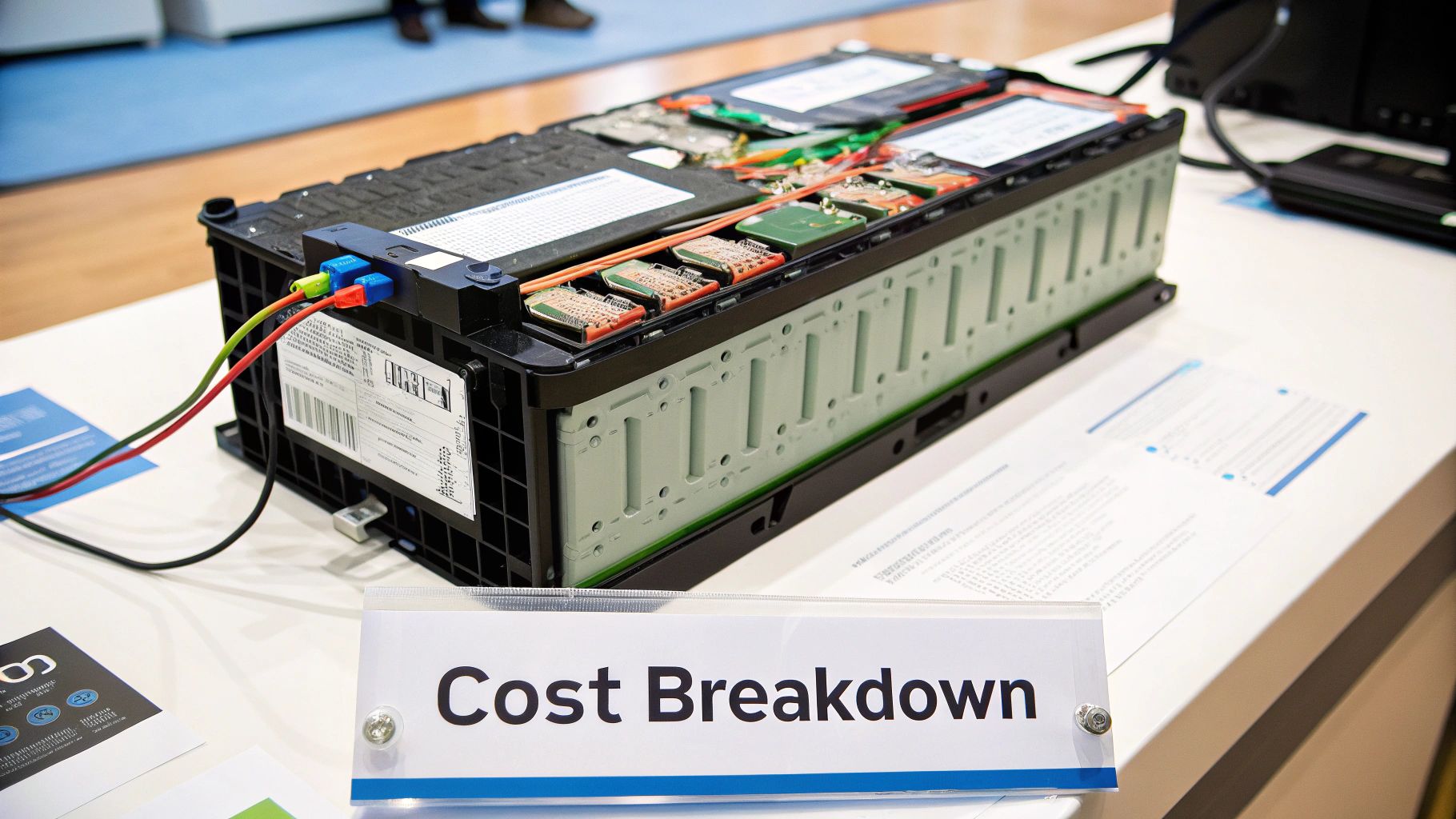
After you've accounted for shipping and freight, the single biggest factor that will sway the final electric car price in Ghana is government policy. The various taxes, duties, and incentives on the books can either inflate the cost significantly or, if you know what to look for, offer some serious savings.
It's a classic two-sided coin. On one side, you have the standard import duties that add to the sticker price. But on the other, you have some genuinely forward-thinking incentives designed to make EVs more affordable for the average Ghanaian. Getting a handle on both is the key to budgeting properly.
For most imported electric cars, you can expect a standard import duty. This has often been a point of debate, as these tariffs can feel like a steep barrier. For a deeper dive into the reasons behind this, our article exploring why EVs are sometimes taxed as luxury items in Africa is a great read.
Unpacking Key Government Incentives
The good news? Ghana’s government is actively trying to tip the scales in favour of electric vehicles. The National Electric Vehicle Policy is a real game-changer, rolling out several measures that directly lower the cost for both buyers and manufacturers.
These aren't just minor adjustments; they signal a real commitment to building a greener transport future. They create a much more welcoming financial landscape for anyone thinking about making the switch.
Here are a few of the most important measures in place right now:
- Local Assembly Waivers: To encourage local industry, Ghana offers an eight-year waiver on import duties for EV kits brought in by authorised assembly plants. This makes EVs built right here in Ghana much more price-competitive.
- Zero-Rated VAT: For a limited time, locally assembled vehicles get the benefit of zero-rated VAT. That's a direct saving passed straight to you when you buy.
- Carbon Levy: A carbon levy was introduced in 2023 that targets vehicles with high emissions. This move makes traditional petrol and diesel cars more expensive to own, which in turn makes EVs a more attractive financial choice.
Ghana's policies are about more than just selling cars. They're designed to build a complete local EV ecosystem from the ground up. By encouraging local assembly and penalising high-emission vehicles, the government is actively steering the market toward a cleaner future.
This strategy is all laid out in the National Electric Vehicle Policy (2024–2026), the blueprint for the country's EV ambitions. It uses targeted tax breaks and duty waivers to spark both imports and local assembly. For instance, the carbon levy on polluting vehicles, which can range from GHS 75 to GHS 300, sends a clear message to the market. It’s a fascinating time for the industry, and you can discover more insights about Ghana's growing EV market to see the bigger picture.
Comparing Popular EV Models Available in Ghana
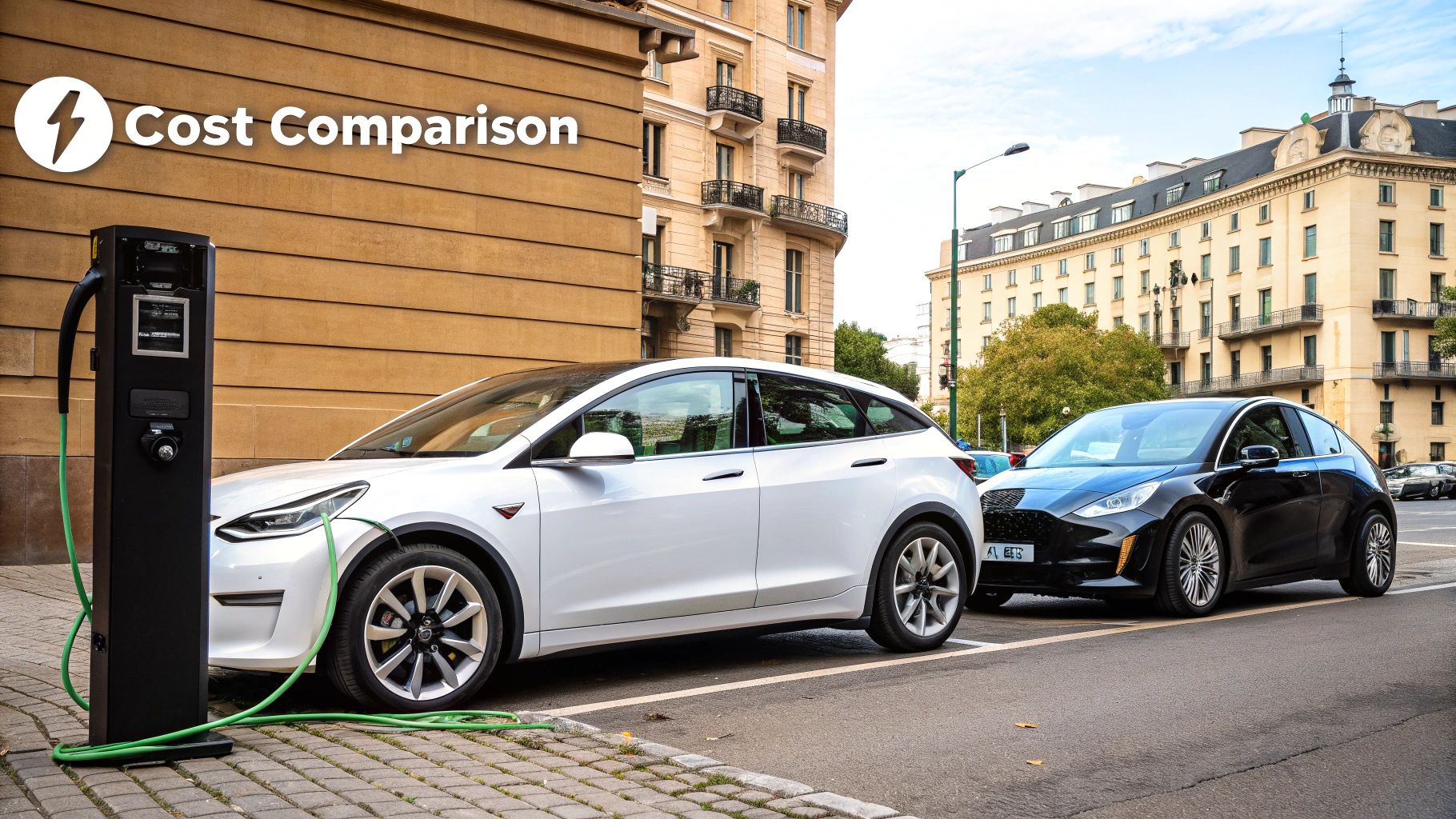
Alright, now that we've unpacked all the costs that go into getting an EV to your driveway, let's get to the exciting part: what can you actually buy? Ghana's electric car scene is growing fast, and there are solid options popping up across every price point. Whether you need a simple runabout for town or a high-spec machine, there’s an EV out there for you.
But a smart purchase is about more than just the sticker price. You have to look at the whole picture—what do you get for your money? We’re talking about real-world battery range, how quickly it charges, and the little features that make a car a great fit for your daily life.
Let's break down a few of the models making waves in Ghana right now.
Budget-Friendly: The Leapmotor T03
For drivers eager to go electric without breaking the bank, the Leapmotor T03 is a real game-changer. This compact car is all about making EV ownership accessible.
It’s perfect for city life. The T03 offers more than enough range for daily commutes around Accra or Kumasi, and its smaller size makes it a breeze to park. It’s an ideal choice for first-time EV owners or as an economical second family car. Its biggest selling point? A price tag that finally makes the electric car price in Ghana feel within reach for more people.
Mid-Range All-Rounder: The BYD Atto 3
If you're looking for that sweet spot of price, features, and performance, the BYD Atto 3 is a top contender. It’s a versatile SUV that just works for so many different types of drivers.
What makes it stand out is its "Blade Battery" technology. This isn't just marketing speak—it genuinely offers better safety and a longer lifespan, which is a huge plus for anyone thinking about long-term ownership. It gives you a solid real-world range, easily handling the daily grind and even longer trips on the weekend without giving you 'range anxiety.'
To get a deeper understanding of how cars like the Atto 3 are sourced and priced for the local market, check out our 2025 guide to buying electric cars in Ghana.
Premium Performance: The Tesla Model Y
When you move into the premium end of the market, cars like the Tesla Model Y are leading the charge. This isn’t just about getting from A to B; it’s about the experience.
The premium segment is where technology, speed, and luxury really come together. Features like Tesla's Autopilot, a radically minimalist interior, and constant over-the-air software updates feel like you’re driving a car from the future, today.
The Model Y delivers impressive acceleration, a massive range that opens up cross-country travel, and access to a superb charging network. It's built for those who want the absolute best in EV technology.
Comparison of Popular EV Models in Ghana
Seeing the numbers side-by-side is often the best way to get a feel for the market. This table gives you a snapshot of how these popular models stack up against each other, from their base cost to their final landed price in Ghana.
| Model | Category | Est. Base Price (USD) | Est. Landed Cost in Ghana (USD) | Battery Range (km) | Key Feature |
|---|---|---|---|---|---|
| Leapmotor T03 | Budget-Friendly | $12,000 | $18,000 – $22,000 | ~300 km | Unbeatable value for city driving |
| BYD Atto 3 | Mid-Range | $25,000 | $35,000 – $42,000 | ~420 km | Safe "Blade Battery" technology |
| Tesla Model Y | Premium | $45,000 | $60,000 – $70,000+ | ~530 km | Cutting-edge tech & performance |
This comparison should give you a much clearer idea of what your budget can get you. The estimated landed cost includes the vehicle price plus our projections for shipping and duties, helping you see the true final figure.
Calculating the True Cost of EV Ownership
Thinking about the electric car price in Ghana? The number you see in the showroom is really just the beginning of the story. To get the full picture, you have to look past that initial price tag and consider what it will actually cost to own and run the car for years to come. That’s where the real value of an EV starts to shine.
The sticker price can feel like a big mountain to climb, but the day-to-day running costs are the long road that follows. It's easy to get fixated on that first payment, but it’s the ongoing expenses that truly define your financial journey with a vehicle.
Don’t forget the upfront costs that aren't on the price tag. For instance, getting a dedicated home charging station installed is a one-time expense, but it’s a game-changer. It makes charging overnight super convenient and cheap, and honestly, it’s what makes the EV experience so smooth.
Long-Term Savings on Fuel and Maintenance
Here’s where owning an EV really starts to pay off: the massive savings on "fuel" and maintenance. Think about it—an electric motor is mechanically simple compared to a traditional petrol or diesel engine. It has far fewer bits and pieces that can wear out or break.
This simplicity leads to some fantastic savings right away:
- No More Oil Changes: That’s right. You can permanently cross messy and expensive oil changes off your to-do list.
- Fewer Service Visits: Forget about dealing with spark plugs, fan belts, timing belts, or entire exhaust systems. They simply don't exist in an EV.
- Reduced Brake Wear: EVs use something called regenerative braking to slow down, which captures energy and puts less strain on your brake pads. This means they last much, much longer.
These savings add up surprisingly fast. Over a few years, what might have seemed like a higher initial cost can quickly become the more sensible financial choice. The magic happens when the car starts paying you back every time you skip a trip to the mechanic or drive right past a petrol station.
When you shift your thinking from just the purchase price to the total cost of ownership, you start to see the real economic advantage. An EV is an investment that pays you back, one avoided expense at a time.
Of course, you have to look at all the factors. Home charging is a great option for most people, especially since Ghana has over 80% household electricity access. However, it’s worth noting that electricity costs are on the rise, with an estimated 30% increase in 2023. Even so, electricity is still a far more stable and affordable way to power your car than relying on unpredictable fuel prices.
You can learn more about Ghana's EV market dynamics to better understand the balance between government incentives and these running costs.
Where Does the Ghanaian EV Market Stand Today?
Thinking about buying an electric vehicle in Ghana isn't just about picking a new car; it’s about stepping into a market that's just starting to find its feet. It’s an exciting time, but it pays to understand what’s happening on the ground before you jump in. The signs of growth are definitely there, even if there are a few bumps in the road.
You can see this growing curiosity in online search trends. We've seen searches for 'electric cars in Ghana' spike—hitting an index value of 51 on Google Trends back in September 2024—before settling down again. This kind of fluctuation is normal; it often mirrors public chatter around new government policies or the launch of an exciting new model. The key takeaway is that people are interested, and that interest is slowly but surely building. For a deeper dive into these market shifts, you can discover more insights on EV24.africa.
The Big Names and the Big Hurdles
So, who's actually selling EVs here? The market is a mix of global giants and homegrown heroes. You’ll find big international brands like BYD and Tesla, which are setting the standard for performance and technology. But just as important are local players like Kantanka, who are pioneering domestic assembly. This is huge, as local production is key to bringing down the final electric car price in Ghana, especially with government support.
Still, let's be realistic. There are a few challenges that are keeping EVs from going mainstream just yet. Think of them as the growing pains of a new market.
- Charging Up: The public charging network is still in its infancy. For city driving, it's often manageable, but it’s a genuine concern for anyone planning regular long-distance trips.
- Finding the Funds: Getting a loan specifically for an EV can be tricky. Green financing options aren't common yet, which means the upfront cost remains a major roadblock for many Ghanaians.
It's vital to be clear-eyed about these challenges. While the Ghanaian EV market is full of potential, buyers need to know its current limits as well as its bright future. The good news is, as more chargers are installed and banks start offering better financing, owning an EV will only become easier.
At the end of the day, navigating this landscape is a balancing act. You have the exciting promise of new technology on one side and the practical realities of today's market on the other. By understanding both, you can make a smart choice that fits your wallet and your vision for a cleaner way to drive in Ghana.
Common Questions About Buying an EV in Ghana
Alright, so you've crunched the numbers and you're getting serious about making the switch to electric. This is usually the point where the more practical, day-to-day questions start popping up. Let's tackle some of the most common ones to clear the path forward.
What About Financing and Home Charging Costs?
Financing is often the first big question. Let's be frank: dedicated "EV loans" are still a bit new on the scene in Ghana. The good news is that forward-thinking banks like Ecobank and Stanbic Bank are rolling out green loan products, so they should be your first port of call. It's also worth asking dealerships directly, as many have their own in-house payment plans.
Then there's the cost of setting up a home charger. For a proper Level 2 charger, you should budget somewhere between GHS 3,000 and GHS 7,000 for the unit and installation. This is a one-off cost that completely changes the ownership experience, giving you the convenience of waking up to a "full tank" every morning.
That initial setup cost might make you pause, but think of it as an investment. It's what unlocks the huge long-term savings of cheap overnight charging, freeing you from the weekly grind of petrol stations and their fluctuating prices.
Should I Import an EV Myself or Buy From a Local Dealer?
This is a classic dilemma for many prospective EV owners. Do you handle the import process yourself to potentially save some cash, or do you work with a local expert?
-
Direct Importing: Going this route can sometimes look cheaper on paper. However, you're on your own when it comes to navigating Ghana's customs procedures, arranging international shipping, and handling all the paperwork. If something goes wrong, there's no local support to fall back on.
-
Buying Locally: Working with a trusted local dealer like those on our platform is the stress-free option. They handle everything. More importantly, you get peace of mind that comes with professional service, after-sales support, and often, a warranty.
For most people, especially first-time EV buyers, the security and expert guidance you get from a local dealer easily outweighs the gamble of direct importing.
Ready to explore your options without the headache? EV24.africa gives you a clear, fully supported path to ownership, from picking your car to the final handover. Find your perfect electric car in Ghana today at https://ev24.africa.


